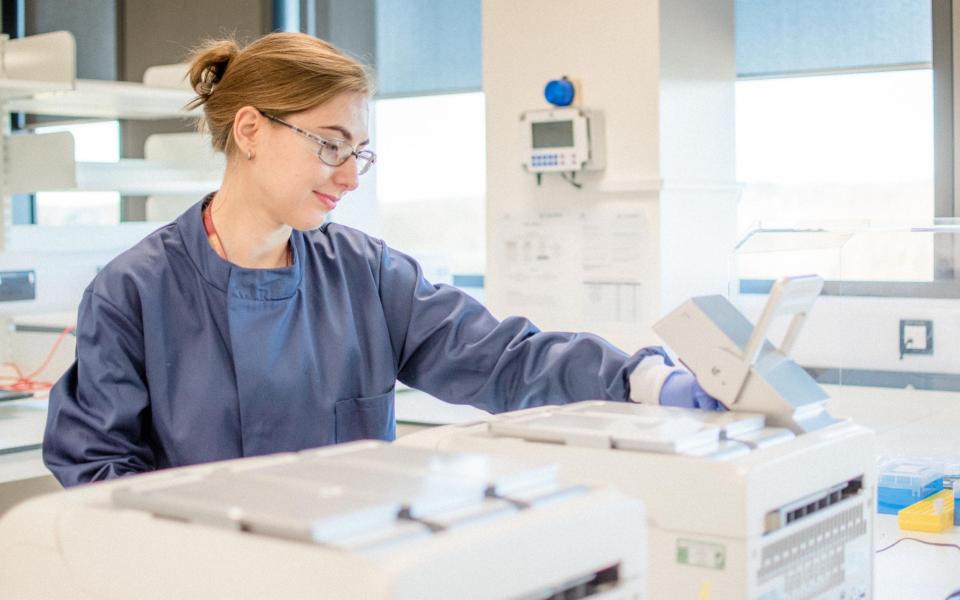How one of the UK’s brightest startups lost its rights to the Oxford vaccine

At Oxford University, a long history of scientific triumph has often not been matched by commercial success. Its failure to exploit the discovery of antibiotics haunts the dreaming spires, according to Robin Wright, the chairman of the Covid vaccine developer Vaccitech.
“A hundred years ago, they were the developers of Alexander Fleming’s big idea,” he says. “They produced the penicillin but they didn’t patent it properly, so they never made any money off it.
“You have to understand that Oxford University still has a chip on its shoulder about that.”
According to Wright, the dim memory of this trauma motivated the institution in tough negotiations last year over the commercialisation of what is now known as “Covid-19 Vaccine AstraZeneca”, even though it was developed by Vaccitech. Resentments from that fraught period still simmer.
“We could very easily have built a network of manufacturers around the world,” says Wright.
“We had already started to do that. We told Oxford that we hadn’t needed them to start the trials, we hadn’t needed them to set up the manufacturing network and we didn’t need them to sell the drug either.”
Nevertheless, Oxford University took control of the intellectual property behind the vaccine and took its place in the history books.
He says Oxford was determined not to make the same mistake again. “They really saw the vaccine as their baby and wanted to have no question marks over it at all,” says Wright.
Vaccitech is now preparing for a $700m (£508m) stock market float in New York later this month. Its crucial role in fighting the pandemic is almost an afterthought.
Its prospectus for potential investors touts its programmes on developing treatments for a chronic hepatitis B infection, for the human papillomavirus infection, and for prostate cancer.
“In addition,” the company says, “we co-invented a Covid-19 vaccine candidate with the University of Oxford.”
“This vaccine is now known as Covid-19 Vaccine AstraZeneca.”
Watching Wuhan

The story of how Vaccitech’s contribution became a footnote turns on negotiations which took place early last year. As Covid-19 started to spread across China, Vaccitech was among the first to respond. Professor Sarah Gilbert, a scientist at Oxford’s Jenner Institute and co-founder of Vaccitech, had been watching the events evolve in Wuhan and had asked Vaccitech if it could adapt one of its existing vaccines.
“The answer was yes, of course we can,” says Wright. “We said we just have to make some changes to the vaccine for Middle Eastern Respiratory Syndrome and then we can produce it.”
Oxford University soon became involved. Vaccitech was already in the middle of flu work, and was preparing for hepatitis B and for human papillomavirus clinical trials. “Oxford said they would do the clinical trials for the Covid-19 vaccine,” Wright explains.
Within the next few weeks, Oxford began to take an increasingly active role. As officials became more and more convinced of the potential for Vaccitech’s technology, the need for a big commercial partner became more urgent.
At the time, it was unclear that any other vaccine would prove to be successful against Covid-19. It was vital to ensure that manufacturing was ready to ramp up and that the regulatory process ran more quickly than ever before.
Swapping small pharma for big pharma
Against this tough backdrop Vaccitech was looking “a bit floppy”, says Sir John Bell, Oxford University’s regius professor of medicine and a senior figure in the vaccine team.

“Their flu virus study had failed in January,” Sir John says. “They were a small company, and we needed a company with muscle to get it done.” At the start of 2020, Vaccitech’s team was made up of 30 staff. Now, it is at 48 full and part-time employees. “We chatted with Vaccitech and said, ‘look, we know you’d like to do this, but you’re not really at a size that could actually manage it’,” Sir John says.
Vaccitech does not think such comments are fair. “Oxford University just didn’t understand it,” says Wright. “They didn’t understand that a commercial company like Vaccitech could help the Jenner Institute to commercialise a vaccine. They didn’t think it was possible. And it was perfectly possible.”
Despite such disagreements, Oxford University forged ahead, pushing for a separate deal to be struck with a large pharma company. The institution held sway partly because Vaccitech was founded on research that it funded.
Under university commercialisation rules, the university spin-out arm Oxford University Innovation (OUI) is entitled to royalties from companies founded by professors. It also aims to take a 50pc equity stake in any spin-out, although can agree smaller shares. Part of its stake is held by the university’s spin-out fund, Oxford Sciences Innovation.
This meant the vaccine was partly owned by the university. However, Oxford also needed Vaccitech to agree to sign over its portion of the intellectual property. Without full control, agreeing a deal with a commercial partner would be tricky.
Fraught talks
The talks “were like any negotiations”, Sir John says. Some reports claim that tensions were high. The Wall Street Journal said that, in one phone call, Vaccitech boss Bill Enright’s job was under threat if the company refused. But, Sir John says, they were purely negotiations.
“We started in one place and they started in another,” he recalls.
Oxford Sciences Innovation made its own view clear, writing to Vaccitech to tell them that, although licensing intellectual property was a decision for the board, the company should do the deal with the university. Oxford insiders insist the aim wasn’t to “make money, but just to get the vaccine out the door”.
The identity of the commercial partner was a significant point of contention. Professor Gilbert and Professor Adrian Hill, Vaccitech’s two scientific founders, were unconvinced by initial plans to work with the US giant Merck. They held parallel meetings with AstraZeneca, ultimately resulting in a deal with the Anglo-Swedish company.
Vaccitech agreed that in exchange for a share of the AstraZeneca tie-up, it would also give the university its share of the intellectual property. Details of this deal were revealed in Vaccitech’s Wall Street float filings, in which it said it was handed a $2.5m one-off payment and would also receive a quarter of the royalties that Oxford would receive from sales, equal to around 1.4pc of net sales.

Neither side was entirely satisfied, says Sir John, something that “probably means we ended up in the right place”.
For Vaccitech investors, making their own assessment has not been easy. The company has been bound by confidentiality around the deal between AstraZeneca and OUI.
Even now, details of the deal remain relatively scant. Even in Vaccitech’s registration document, the company is understood to only be able to put in what has been agreed by AstraZeneca and the university.
Do spin-outs mean some lose out?
Within Oxford, there is some unrest. There do “need to be incentives to keep professors interested in spin-outs”, says Quinton Fivelman, an innovation expert, although this “needs to be carefully weighed with the general public good”. Already, the university had faced accusations it was less friendly towards spin-outs than US institutions, raising fresh questions over whether this could hamper its ability to attract the top brains.
But in Vaccitech’s case, at least being held at arm’s length may be a blessing in disguise. The recent cautious approach of regulators to rare blood clot risks for the Oxford jab threatens to dampen investor demand for the company in its public float.
In the US in particular, where the Oxford vaccine has not been approved by regulators, there is unease about the jab – so much so that some investors have been dubious about the listing destination. With sentiment for the vaccine much stronger in Britain than anywhere else in the world, “I think if we’d have seen this divergence earlier, it would have tipped the balance to London,” one source says.
“When you look back at what’s happened in the last year, boy did we make a good decision?” says Sir John. “You couldn’t really have done what we did without a major pharma company. It would have fallen off in minutes.”
